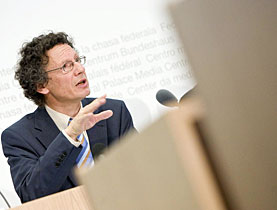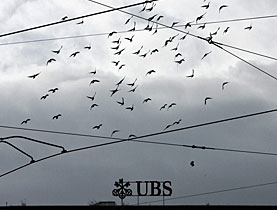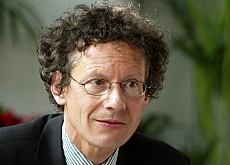Competition chief plays key role in economy

Since becoming president of the Federal Competition Commission in 2003, lawyer Walter Stoffel has learned how to deal with harsh criticism.
He’s had to oversee the introduction of direct sanctions against companies that illegally hindered competition through cartels, abuse of dominant position or merger.
Four years ago, Stoffel began reforming Comco amid criticism too many of the body’s members had ties to the business community and that it lacked credibility.
Around a year later Comco levied fines in the hundreds of millions on telecommunications provider Swisscom for overcharging its rivals’ customers on mobile phone connections – a decision overturned by the Federal Administrative Court only weeks ago.
Not surprisingly, some companies sanctioned by Comco have not agreed with the body’s finding and have not been afraid to vociferously vent their opposition.
Stoffel, who is stepping down later this year, has imposed fines which have reached hundreds of millions of francs – often a painful price for companies to pay when they skirt the rules.
swissinfo.ch: You became president in 2003 and you must have seen your fair share of malpractices. Which case shocked you the most?
Walter Stoffel: The road-surfacing cartel in canton Ticino. This happened in the grace period for the introduction of sanctions. Penalties were introduced only from April 1, 2005.
We discovered the cartel as early as 2003 and investigations were taking their course [into price-fixing and apportionment of work by asphalt producers and construction companies].
But since the sanctions could only be imposed from April 2005, the cartel continued until almost the end of March and only then split up. Although the Ticino companies knew that they were breaking the law and that they should stop their practices, they also knew they could carry on without punishment, a situation they used quite callously. I found that shocking.
swissinfo.ch: If we talk of competition and malpractices in the market, the competition commission and the consumer protection authority are very often not far away from each other. What is the difference between the two?
W.S.: They are quite rightly seen together. Healthy competition makes sense for the consumer because it is to their benefit.
In Switzerland we have the distinction of having a price watchdog alongside the competition authority. The price surveyor acts as a kind of wailing wall for consumers. Both organisations complement each other and cooperation functions well.
swissinfo.ch: Does the competition authority in a small country have more to do than in a big one? Can one see different cartel dangers or malpractices in smaller countries than in large ones?
W.S.: If you look on one level, in Europe, the problems are basically the same and their functions too. But Switzerland isn’t that small. A market with almost eight million people is considerable and there are many large companies. In a European comparison, Luxembourg can be considered small.
On another level, if you compare us with our neighbours, we are naturally much smaller. Therefore we know each other better in Switzerland and are closer.
There’s also a certain tradition of cooperation. As there is less room for companies with a critical mass, you often find companies that dominate the market. But in larger countries you find perhaps more frequent cases of illegal agreements.
swissinfo.ch: What about the powers you have at your disposal? Can you impose sanctions and expose malpractices more easily in Switzerland than your German or other European colleagues?
W.S.: We have the same powers and legal base as other Europeans. Swiss legislation is in accord with the European standard.
Where we have a problem is with staff. We could do with 15-20 per cent more. If there are one or two mergers, as well as the usual workload, employees at the commission are stretched.
swissinfo.ch: And what about the complexity of Swiss companies at the international level? Do you work well as a national competition authority on that issue?
W.S.: That’s an important point. Here we have an issue that involves the whole problematic of our position in Europe. The country is still looking for its proper place.
Cooperation with the authorities of our neighbours, with the competition commission in Brussels and with our overseas colleagues, is excellent and takes place frequently. But it is limited essentially to the exchange of generally accessible information and not to confidential matters in ongoing cases.
This is excluded for both sides and is a big disadvantage because the economy is for us in Switzerland mostly European. Breaches of competition are correspondingly the same; they go beyond the borders of Switzerland.
We and our European partner authorities are at a disadvantage when malpractices occur outside our borders. That’s why we’ve been calling for a cooperation agreement with the EU since 2003 and then with other states.
Such an agreement is more or less ready and the texts are already at the economics ministry. I hope that the green light for negotiations will be given soon.
Alexander Künzle, swissinfo.ch (Adapted from German by Robert Brookes)
Comco is an independent federal authority with its own secretariat.
It consists of 12 members who are elected by the government. The presidency has three members.
The Federal Cartel Act demands that the majority of the members of the Competition Commission are independent experts – usually law and economics professors. Other seats are taken by representatives of business associations and consumer organisations.
Whenever a procedure results in the observation that competition is hindered in an unlawful way through concerted practice, abuse of dominant position or merger, the Competition Commission acts directly against the initiator.
Appeals against the decisions may be addressed to the Federal Administrative Court. Appeals can be taken as far as the Federal Court in Lausanne.
The Fribourg professor is stepping down as president of the Federal Competition Commission in the middle of the year.
He has been employed by the Competition Commission for 12 years, presiding it since 2003.
During his term of office, revisions were implemented in cartel legislation and a system of direct sanctions was put in place.
In particular, penalties were imposed on the construction sector, the issue of parallel imports was high on the agenda and there were major takeovers in the retail sector. Migros acquired Denner, while Coop bought the Swiss business of Carrefour.
The Cartel Commission has also been looking at liberalisation in Switzerland, which some consider has progressed only at a snail’s pace. A close eye has been kept on the electricity and communications sectors.

In compliance with the JTI standards
More: SWI swissinfo.ch certified by the Journalism Trust Initiative




You can find an overview of ongoing debates with our journalists here . Please join us!
If you want to start a conversation about a topic raised in this article or want to report factual errors, email us at english@swissinfo.ch.